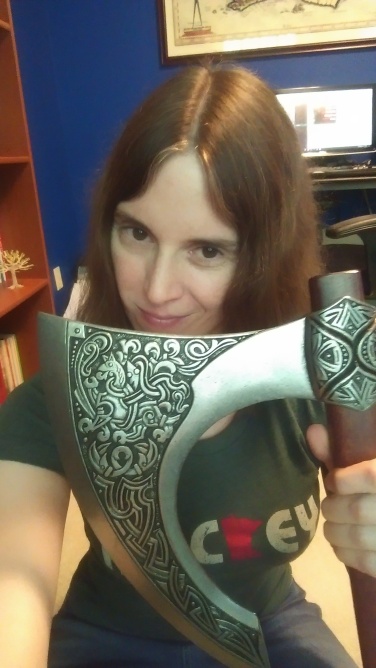by Marissa Lingen
Who gets to have adventures in space? Who gets to poke around enjoying the wonders of science? It depends on who the story is aimed at, of course, but when a friend of mine was solo parenting a young son, the little boy complained that parents and children never got to have adventures together. And this struck me as largely true. In kids’ books, kids have adventures without the parents, and in adult books, adults mostly try to have adventures without kids.
But . . . well . . . there are some times in people’s lives when parents and kids are largely a package deal. It’s great to imagine utopian futures where there are zero barriers to this! When it all falls together with nary a murmur, when people can just do that. I love those futures. But . . . that wasn’t what I wanted to do this time [“Finding Their Footing,” on sale in our May/June issue now].
This time I wanted to acknowledge a future where we don’t have it all figured out yet. Where money and debt and families and childcare are all still complicated.
Where kids are still kids—not aspirational child heroes who save every day—and yet have the curiosity I see in the children around me, and also the fierce loyalty. And the parents have that fierce loyalty too—and some of their curiosity, too.
The little boy I mentioned above is now in his mid-twenties. It’s an old anecdote, but the problem remained—and still remains now. One story won’t solve it. My friend the solo parent was science fiction and fantasy author Jo Walton. And I wrote this story for Jo, as a birthday present for her, using not only the science fiction ideas that we both love but also the sorts of fiction we both love outside our genre, as a sort of emotional touchstone.
I was reading a lot of mid-century British women literary authors while I was writing it, the sort of authors who didn’t write about adventures of the science fiction sort at all but were still thinking a lot—quite a lot—about children and adults sharing space from an adult perspective, rather than a kids’ book perspective. I read a lot of A.S. Byatt, for example. I thought about what A.S. Byatt’s characters might be doing in space, if they were from a staggeringly different set of cultures and times and interests.
It came out an Analog story, and that made me happy. I really feel—I very, very strongly feel—that what makes an Analog story is the focus on science in the science fiction, not on a particular kind of character and especially not a particular demographic of character. I’m glad that the Analog editors have agreed with me through such a range of characters (with more to come this year!).
Science is for all of us. Science is for everyone. Science fiction—even hard science fiction—isn’t just the PR arm of the sciences, but it’s one of the things I love being able to do: giving people a glimpse of what’s exciting and real in the natural world, and giving it to them in a shape of story that makes it more intimate, more personal, rather than distanced and less real.
Not just: here is a thing we think the natural world does, isn’t that neat? But: here is how we think some humans might react, here are some human lives that might intersect with the natural world in strange and wondrous and utterly, utterly human ways.
And of course part of that is the ability to give characters my own fascinations and interests, in the natural world, and that leads us to cryovolcanoes. At least, it led me to cryovolcanoes! But really, who wouldn’t want to go down a cryovolcano and see what the insides are like? If I was a small kid, I absolutely would. I do now. Put me on the next shuttle. The things water can do in Earth atmosphere/pressure are interesting enough, but throwing in exotic temperatures and pressures, throwing in other substances like methane and ammonia . . . and suddenly you have something that behaves like molten rock, but is made of water? How could this not be utterly captivating?
Small children who grow up in Southern California have different ideas of what an ordinary weekend outing vs. a strange adventurous journey look like, compared to children who grow up in my own Minnesota—vs. children who grow up on other parts of the planet. How much more so, children growing up on spaceships, stations, colonies on various moons?
The scientists who study cryovolcanoes have great jobs. I really believe that there are decades and centuries of that ahead of us. And I will circle back to telling stories about those scientists directly. But this time, the delighted face at the new discovery had to have a little bit different angle.



One comment